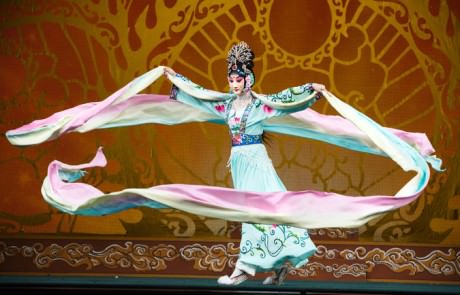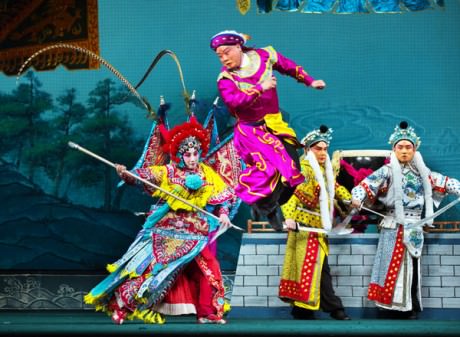What a fabulous immersion into the dazzling world of the Peking Opera as The Kennedy Center hosted two performances to celebrate the 120th Anniversary of the birth of Mei Lanfang, a Jingju (Peking Opera) artist from China. The full-house at The Kennedy Center Opera House was even welcomed to the Wednesday evening performance by Mei Lanfang’s 80 year-old son.
The Wednesday evening performance by the Jingju Theater Company of Beijing and Mei Lanfan Jingu Troupe, consisted of five different 20 minute or so operas based upon ancient Chinese folklore described as “Classic Plays of the Mei School.” The five operas included the performance of: The Goddess of Heaven Scatters Flowers, Pierce the Mussel, Resisting Jin Troops, Farewell My Concubine, and Drunken Beauty.

Mei Lanfang (1894-1961) was a major figure in Peking Opera over his many decades of life. When looks at his years of life, they spanned many changes and upheavals in China. During the 1930’s Mei Lanfang visited the United States and knew many a movie star of those days.
The Kennedy Center performance last night, on Wednesday evening, August 27, 2014, gave me an eye-full and ear-full of vocals, music, movement and even acrobatics on a grand scale along with lavish costumes and visually arresting make-up and masks. I gulped down all that the Peking Opera troupe provided as they your reviewer to far-away lands, far-off times, and a new appreciation for the appearance of feminine beauty and masculine gruffness.
First, you might ask, for an evening sung and spoken in Mandarin, with non-Western musical instruments, what could be understood, let alone appreciated? Well, there were easily seen and read English language text providing a synopsis of each of the five operas before the curtain went up for each. Then, there was projected English language translations of what was sung and spoken. The text was projected onto two locations placed on stage at audience right and left for easy reading without taking away from the connection to the performance and performers.
There was also a moderator at the very beginning of the evening who provided useful information for understanding of the Peking Opera. She made mention that in Peking Opera, music follows the story line rather than being front and center propelling the performance. The Kennedy Center program was also a helpful read before the curtain went up.
In the Classic Plays of the Mei School the characters were generally arch-types: more like what we may recall in the Brothers Grimm fairy tales representing a world of good and evil, male and female, soft and hard, peaceful and war-like. It was not difficult to appreciate what and who a performer represented.
Then there are the costumes for each character. They are a joyful wonder and feast of visuals. They are lavish, beautiful, colorful, silky for featured female characters. They are richly brocade for featured male characters. Many characters are portrayed with eye-popping princess crowns, masks, long beards for Emperors and Generals and lots and lots of wigs and plenty of swords and fighting sticks. When twenty or so performers appear across the Kennedy Center Opera house stage or move to give layers of depth was often a pastel-lovers sense of Heaven. My wife gasped in pleasure at the costumes. She later mentioned how stunning the pinks, turquoise, and sea blue of the silky fabric were.
Several other notable features about the costumes. In the first opera, The Goddess of Heaven Scatters Flowers the Goddess not only wore beautiful clothes, but effortlessly used about 25 feet of silk ribbons to give visual expression to her dialogue and arias. The silk floated and swirled as if weightless. The ribbons had their own sense of gravity. The best way to describe how the ribbons moved is to think of the Olympics and Rhythmic gymnastics. But this is done right before the audience’s eyes. Mesmerizing.
Another notable costume feature was seen in the last performance, Drunken Beauty. For this opera, the main character, the consort to the Emperor, had overlong sleeves used to used to depict mood and temperament. A flick of the wrist here, a move to cover hands there, little hints of choreographed fingers, added unspoken visual whispers and shouts. There were also two somewhat clownish eunuchs who used their sleeves to affect as well. In “Pierce the Mussel” a most adorable little clam was decked out in a pink shell that opened and closed in a most teasing, tantalizing youthful manner. Really, honest.
As for the music, it was chock full of gongs, various pitched string instruments, some bowed (erhu and zhonghu), some plucked (pipa), as well as drums, cello, bells, and a loot-like instrument called the ruan.
The vocals were often a well-modulated, high piercing soprano along with male baritones. Yes, the vocalizations were different from the Western music that I am more familiar. My favorite performances were Don Xiaoxuan as the Goddess (the character journeys to scatter colorful flowers to bring peace);Hu Wenge as Yang Yuhuan (the character is a consort who becomes drunk when humilated by the Emperor); and Li Hongyan, as Liang Hongyu (the character directs soldiers to defeat the enemy).
Movement is something to behold. The female characters move with dainty, small, utterly smooth, soft steps as if floating on air. No noise is heard as they walk about. For some of the ensemble characters, their feet were arrayed with slippers that have cute pink pom poms that bounced gingerly as they moved. For the various lead female characters, there was a sensual fluidness as they slowly moved to emphasize actions or internal thoughts. And, female characterizations can be acts of such believable concealment of gender when depicted by a male. Shades of M’ Butterfly perhaps.
Acrobatics were employed in several of the operas; well accomplished tumbles and spins, and sometimes in a slow-motion Tai Chi type movement. Facial make-up was clearly important for characterization. Those familiar with DC’s Faction of Fools and “Commedia dell’arte” will especially understand character arch type through masks.
The stage was not filled to over-flowing with scenery or props. The backdrop gave off a sense of place and time. Often it was the ensemble standing quite still and silent becoming a kind of scenery or prop for the main action.

So, the Peking Opera was a golden opportunity to get acquainted with something very different from one’s usual entertainment around town. There was simplicity to the evening that gave it a stronger hold even without understanding Mandarin. Few of the short operas overstayed their welcome. And lines such as this brought a smile, “Let me show my meager talents” said a Consort to the Emperor. Hah, meager indeed.The Consort was so sly and cunning speaking up through her eyes with eye lids covered in a lovely shade of deep pink. Certainly I fell for it!
Featured Cast:
Dou Xiaoxuan (The Goddess)
Zhang Xinyue (Lina Jinfeng)
Li Hongyan (Liang Hongyu)
Shang Wei (Yu Ji)
Chen Junjie (Xiang Yu)
Hu Wenge (Yang Yuhuan)
Artistic:
Mei Baojiu, Director of Mei Landfang Jingju Troupe
Li Enjie, President and Director, Jingju Theater Company of Beijing
Mei Baijiu, Artistic Director
Li Hongtu, Director of Mei Lanfang Jingju Troupe
Lin Liyuan, Artistic Consultant
Zhou Jiaxin, Stage Manager
Musical Conductor: Zhu Shaoyu
Running Time Two hours and 30 minutes, with one 15-minute intermission.
Wu Promotions presents: Peking Opera – 120th Anniversary of Mei Lanfang plays August 27 and 28, 2014 at The John F. Kennedy Center for the Performing Arts’ Opera House – 2700 F Street, NW, in Washington, DC. August 27 & 28, 2014.
Tonight, Lady Mu Guiying Takes Command begins at 7:30 PM. For tickets, For tickets, call (202) 467-4600, or purchase them online.




